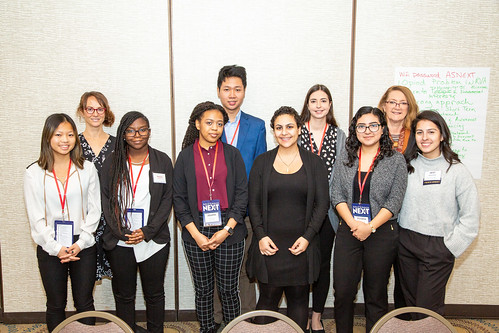Hands-on Experience at A&S Next
At A&S Next, students in the School of Arts and Sciences leveraged their University of Richmond education to confront global issues and experience professional growth.
On Friday, January 25, and Saturday, January 26, students of all class years gathered with Richmond faculty, alumni and staff at the Richmond Marriott for two days of learning and reflection. The weekend underscored the positives of examining Richmond-area and global problems from a liberal arts background.
“Arts and Sciences Next is aimed at helping you to make the translation from what you’re studying in class to the skills that you might use across the world,” Dr. Patrice Rankine, Dean, School of Arts and Sciences said.
Students chose to participate in one of six case groups at A&S Next, ranging in disciplines from public health to arts, creativity and culture. In these groups, students encountered cases that pushed them to explore the limits of their education. They tackled issues like the opioid epidemic, data collection, and modern-day human trafficking.
Case studies provided students the opportunity to engage with other disciplines as they participated in their groups with students from different academic backgrounds and engaged in case topics outside of their own majors.
Over 70 alumni participated in A&S NEXT, serving as real-world examples of interdisciplinary success and operating as field experts in student case groups. Using their real-world experience, alumni facilitators guided students to thinking in new ways about their case problem.
In a public health case group, Ben Paul ’11, policy analyst at Virginia Commonwealth University, led students to examine the opioid epidemic from both short- and long-term lenses.
As a result, students proposed a three-pronged treatment plan for opioid addicts that included an immediate response harm reduction house, a recovery plan for overdoses, and a long-term support network for addicts.
Faculty participants were also integral to students’ success during A&S Next. Thirteen faculty members acted as facilitators in student case groups and helped students uncover new ways of thinking.
As they applied their field inquiries to case problems, faculty facilitators exposed students to academic specialties that they might not receive in a traditional, structured class setting. Like alumni, they guided student thought to confront their case issues from new angles.
In a Sustainability case group, Dr. Rob Andrejewski, director of sustainability and adjunct assistant professor of nonprofit studies, advised students to define and explore biophilic cities.
This suggestion led students to propose a case solution that would incorporate green spaces into disadvantaged areas of Richmond to provide health benefits for the community and the environment.
“A&S Next was an awesome opportunity to engage with both alumni and professors. It was truly fascinating to be able to utilize their respective career and academic expertise while brainstorming a solution to our specific case,” Ali O’Hara, ’20, said. “I’m incredibly grateful to all those who gave us their time in order to help us grow!”
After meeting with their case groups on the first day of A&S Next, students developed skills beyond applying their major to case studies; A&S students also were able to learn about their professional strengths and develop new ones.
Students first took a skills test, which helped them to identify their professional strengths and weaknesses.
“What resonated with me is the list of strengths they gave every student,” said Sana Azem,’22, a humanities fellow at Richmond. “It gives us the opportunity to learn about our own selves.”
Then, students put these strengths into action. On Friday night, they participated in a networking reception with alumni after reviewing networking skills with career services.
After networking, students took the skills they learned into day two of A&S Next, where they further developed their case solutions and practiced presentation skills.
Following their case preparation, groups were split into two tracks, where they presented their cases to other groups, faculty, alumni, and facilitators. After voting, two groups were chosen to compete for the final case prize.
With their three-pronged approach to opioid addiction, public health case group A was declared the winner.
On Saturday night, students left downtown Richmond with more connections, more knowledge, and more professional skills than when they arrived.

